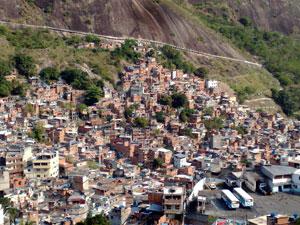Bringing business to Brazil’s slums
Rocinha (Image by paula le dieu (cc:by))
This story was originally covered by PRI’s The World. For more, listen to the audio above.
Brazil’s economy is growing at an astounding rate, and many expect the country to soon become an economic superpower. The recent success has even begun to spread into Rio de Janeiro’s notorious slums known as favelas. Some residents say movies like City of God or tours that highlight the poverty and drug trafficking in Brazil’s favelas don’t give the whole picture of what life is like here.
Inside of Rocinha, one of the largest and most notorious favelas, the government estimates that there are now some 5,000 locally owned businesses.
“People think that there are only dirty and uneducated people here,” Eduardo Casaes, a lifelong resident of Rocinha who serves as a liaison between his community and the Rio government, told PRI’s The World. “But we have jobs, it’s really a middle class neighborhood. People go to work and children go to school here.”
The main problem with Rocinha and other favelas is their infrastructure, according to Casaes. Buildings are dilapidated and the streets are narrow and clogged with motorbikes and pedestrians.
Other people believe that Rocinha’s layout actually works to their advantage. Carlos Roberto de Azevedo, who owns two minimarkets in the favela, told The World, “There are a lot of opportunities for various types of businesses, because it’s a very concentrated area with many people walking around. There’s a lot of demand for different types of businesses.”
More and more companies are trying to get to consumers, according to Andrea Gouvea Viera, a city official working closely with the Rocinha community association. “But we still have a problem,” she says, “that’s the security, and we still have a problem with the trafficked drugs.” There are also problems with people illegally tapping into energy supplies, and tax evaders in an almost exclusively cash economy.
Local business people, however, dismiss these problems. Minimarket owner Carlos Roberto de Azevedo says the setbacks and reputation shouldn’t prevent outsiders from setting up shop. He points out that a Brazilian franchise restaurant opened up a while ago and it hasn’t had any problems. He says:
It will help the favela’s image if more businesses come here. Nothing bad has happened to the restaurant, it’s never been robbed. Companies and banks need to stop being afraid of opening businesses here.
PRI’s “The World” is a one-hour, weekday radio news magazine offering a mix of news, features, interviews, and music from around the globe. “The World” is a co-production of the BBC World Service, PRI and WGBH Boston. More “The World.”
